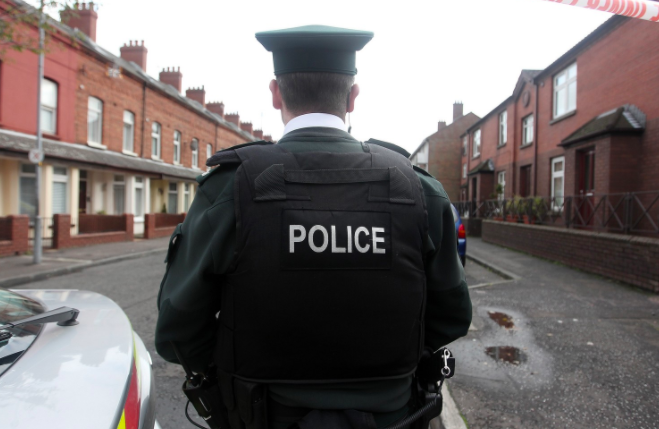POLICE officers conducted close to double the number of security-based stop and searches on Catholics as Protestants in one-year, new research shows.
Of more than 3,100 Justice and Security Act stop and search cases over a period of 12 months – in which the religious background of those subjected to these powers was recorded – 62% were Catholics, 33% were Protestants and the remainder were classed as ‘other/none’.
The Police Service of Northern Ireland (PSNI) produced this analysis by mapping Justice and Security Act stop and search statistics, from August 2020 to July 2021, against results from the 2011 Census 'small areas’.
Daniel Holder – the deputy director of the human rights organisation, Committee on the Administration of Justice (CAJ) – acknowledged these are “proxy indicators” and as such, have limitations, but added that the data shows “such a significant disparity” that it “requires further explanation”.
He told The Detail: “Disparity does not necessarily mean discrimination if there is an objective justification. For example, if there was a situation where paramilitary groups drawn largely from one side of the community were the only ones active in ways relevant to the powers.
“However, this is not presently the case and we should not discount the possibility that discriminatory practices may be playing a role here – particularly in light of similar disparities in relation to police powers, including general arrest rates.”
PSNI Chief Superintendent Sam Donaldson told The Detail the PSNI does not “target individuals or groups”, but that it responds to “crimes reported by members of the public, information relating to specific crimes and information relating to crime trends”.
The senior police officer also said the PSNI uses stop and search powers to “help protect communities” and “keep you safe”, and that it’s “fully committed to ensuring the fair, effective and legitimate use of stop and search powers which are vital in helping us prevent, detect and investigate crime”.
Our report on security-based stop and search data follows arrests made after petrol bomb attacks on police officers in Derry following an Easter Monday parade.
This came off-the-back of a number of bomb threats widely believed to be connected to loyalist paramilitary dissatisfaction with aspects of the Brexit Withdrawal Agreement, signed by the UK Government and the EU.
Less than one per cent arrest rate
When stop and search powers are applied under the Justice and Security Act, it is for security reasons. This legislation was used to justify 16% of stop and searches conducted by the PSNI in 2020/2021. However, these instances resulted in arrests at a rate of less than one per cent.
By contrast, stop and searches carried out under the Misuse of Drugs Act – which accounted for the majority (72%) of stop and searches in 2020/2021 – had an arrest rate of five per cent.
The remaining stop and searches were performed under the Police and Criminal Evidence (Northern Ireland) Order. These resulted in arrests 15% of the time.
Chief Superintendent Donaldson said: “We do not regard arrest as the only positive outcome as a result of stop and search, with consideration given to other disposals such as community resolution notices.
“Our outcome rates are similar to police services in England, Scotland and Wales who use the same enabling legislation.” However, a report by The Detail last year found Northern Ireland had the third highest stop and search levels in the UK, but the lowest arrest rate.
CAJ’s Mr Holder said: “The ‘no suspicion’ Justice and Security Act powers present an additional risk of arbitrary and discriminatory usage because the normal threshold of ‘reasonable suspicion’ does not apply, although the powers should only be used for their intended purpose.
“We have been concerned that these powers have at times been used to instead disrupt persons who the police suspect may have paramilitary links, by stopping the same individuals repeatedly when their identity is already known, which is likely to be counterproductive.”
Chief Superintendent Donaldson said he recognises stop and search is a “sensitive issue for our communities” but that the PSNI “continually” reviews its approach to ensure it’s “used effectively and proportionately”.
Recording community background
The PSNI do not normally record the community background of people subjected to stop and search.
However, in February 2020 – as a result of legal action first launched by Steven Ramsey, from Derry, in 2013 – the former Lord Chief Justice, Sir Declan Morgan, ruled that the PSNI should record this information.
Sir Declan said “some proportionate measure” should be put in place to “ensure that there can be adequate monitoring and supervision of the community background of those being stopped and searched”.
This was also previously recommended in a Policing Board human rights review of stop and search, published in October 2013.
The report stated that the PSNI should “as soon as reasonably practicable but, in any event, within three months…include within its recording form – the community background of the person stopped and searched or questioned".
A spokesperson for the Policing Board also told The Detail: “Since then, progress on recommendations in this area have been the subject of extensive discussion and scrutiny by the board.
“The board’s scrutiny of this area and the position with implementation of recommendations, made in respect of stop and search, have been documented year on year in the board’s human rights annual reports.”
The Policing Board’s last annual human rights report, which covers 2020/2021, recommended: “The system for recording community background is put in place quickly and, at least, by January 1, 2022.”
However, this has not happened.
“Kick the can down the road”
While the PSNI has now acknowledged its current approach, in not recording community background, is not legally tenable – the force only carried out the stop and search religious background research due to an instruction from the Independent Reviewer of the Justice and Security Act in Northern Ireland, David Seymour.
The PSNI wrote to Mr Seymour in November 2020, outlining a planned programme of work relating to the potential recording of community background of those subjected to stop and search.
However, in his most recent annual report – published last year – the independent reviewer said: “Given the lack of progress on this subject over the past seven years, a sceptical observer might view this programme of work as an attempt to kick the can down the road.
“Indeed, it could be argued that this programme of work is unnecessary. All that is required is a separate assessment, after the event – based on intelligence, existing information and officer perception of the individual’s background. This should not be difficult.”
Mr Holder said: “Ethnic monitoring, which clearly must include community background in our local context, is a vital tool to identify and then remedy potentially discriminatory practices and patterns. Ethnic monitoring is commonplace in many other jurisdictions, it is not rocket science.
“There has been a long running saga where the PSNI has resisted collecting ethnic monitoring data on community background in relation to the use of powers like stop and search despite numerous oversight recommendations to do so. It has almost become an annual event wondering what the latest excuse will be.”
“Significant research”
Chief Superintendent Donaldson was asked if the PSNI will now make a firm commitment to recording the community background of people subjected to stop and searches.
The senior officer replied by stating that the PSNI has “progressed significant research with a view to establishing options for implementation” of recording community background.
He also said that through this and via engagement with other statutory powers, the PSNI has “agreed to take forward enabling legislation which would allow officers to capture the required information”.
However, CAJ’s Mr Holder said: “We are at the stage, many years on, where ethnic monitoring of community background should be happening – rather than being further explored.
“It is still unclear what the PSNI now intends to do and there is still no clear commitment to implementing what is a long-standing recommendation.”
This report follows a December 2021 article published by The Detail on PSNI arrest and charge data.
We revealed that almost twice as many Catholics as Protestants were both arrested and charged by the PSNI over a five-year-period.
In addition to over 3,100 Justice and Security Act stop and search cases in which religious background was recorded, a further 1,200 or so cases – in which religion was not recorded – were also assessed by police.
Similarly, a significant minority of cases in The Detail’s report on PSNI arrest and charge data saw no community background recorded.
However, there is no evidence that this is a contributing factor to the large disparity in the numbers of Catholics and Protestants referenced in either report.
Chief Superintendent Donaldson said the PSNI is “continuing to review this data with a view to identifying any relevant trends or learning”.
 By
By

